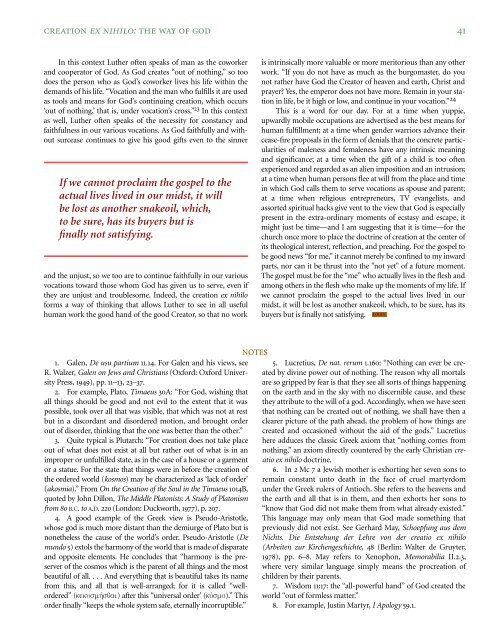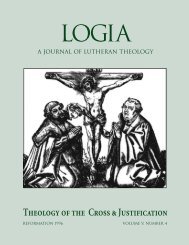04-2 Hermeneutics.pdf
04-2 Hermeneutics.pdf
04-2 Hermeneutics.pdf
- No tags were found...
You also want an ePaper? Increase the reach of your titles
YUMPU automatically turns print PDFs into web optimized ePapers that Google loves.
CREATION EX NIHILO: THE WAY OF GOD 41In this context Luther often speaks of man as the coworkerand cooperator of God. As God creates “out of nothing,” so toodoes the person who as God’s coworker lives his life within thedemands of his life. “Vocation and the man who fulfills it are usedas tools and means for God’s continuing creation, which occurs‘out of nothing,’ that is, under vocation’s cross.” 23 In this contextas well, Luther often speaks of the necessity for constancy andfaithfulness in our various vocations. As God faithfully and withoutsurcease continues to give his good gifts even to the sinnerIf we cannot proclaim the gospel to theactual lives lived in our midst, it willbe lost as another snakeoil, which,to be sure, has its buyers but isfinally not satisfying.nband the unjust, so we too are to continue faithfully in our variousvocations toward those whom God has given us to serve, even ifthey are unjust and troublesome. Indeed, the creation ex nihiloforms a way of thinking that allows Luther to see in all usefulhuman work the good hand of the good Creator, so that no workis intrinsically more valuable or more meritorious than any otherwork. “If you do not have as much as the burgomaster, do younot rather have God the Creator of heaven and earth, Christ andprayer? Yes, the emperor does not have more. Remain in your stationin life, be it high or low, and continue in your vocation.” 24This is a word for our day. For at a time when yuppie,upwardly mobile occupations are advertised as the best means forhuman fulfillment; at a time when gender warriors advance theircease-fire proposals in the form of denials that the concrete particularitiesof maleness and femaleness have any intrinsic meaningand significance; at a time when the gift of a child is too oftenexperienced and regarded as an alien imposition and an intrusion;at a time when human persons flee at will from the place and timein which God calls them to serve vocations as spouse and parent;at a time when religious entrepreneurs, TV evangelists, andassorted spiritual hacks give vent to the view that God is especiallypresent in the extra-ordinary moments of ecstasy and escape, itmight just be time—and I am suggesting that it is time—for thechurch once more to place the doctrine of creation at the center ofits theological interest, reflection, and preaching. For the gospel tobe good news “for me,” it cannot merely be confined to my inwardparts, nor can it be thrust into the "not yet" of a future moment.The gospel must be for the “me” who actually lives in the flesh andamong others in the flesh who make up the moments of my life. Ifwe cannot proclaim the gospel to the actual lives lived in ourmidst, it will be lost as another snakeoil, which, to be sure, has itsbuyers but is finally not satisfying. LOGIA1. Galen, De usu partium 11.14. For Galen and his views, seeR. Walzer, Galen on Jews and Christians (Oxford: Oxford UniversityPress, 1949), pp. 11–13, 23–37.2. For example, Plato, Timaeus 30A: “For God, wishing thatall things should be good and not evil to the extent that it waspossible, took over all that was visible, that which was not at restbut in a discordant and disordered motion, and brought orderout of disorder, thinking that the one was better than the other.”3. Quite typical is Plutarch: “For creation does not take placeout of what does not exist at all but rather out of what is in animproper or unfulfilled state, as in the case of a house or a garmentor a statue. For the state that things were in before the creation ofthe ordered world (kosmos) may be characterized as ‘lack of order’(akosmia).” From On the Creation of the Soul in the Timaeus 1014B,quoted by John Dillon, The Middle Platonists: A Study of Platonismfrom 80 B.C. to A.D. 220 (London: Duckworth, 1977), p. 207.4. A good example of the Greek view is Pseudo-Aristotle,whose god is much more distant than the demiurge of Plato but isnonetheless the cause of the world’s order. Pseudo-Aristotle (Demundo 5) extols the harmony of the world that is made of disparateand opposite elements. He concludes that “harmony is the preserverof the cosmos which is the parent of all things and the mostbeautiful of all. . . . And everything that is beautiful takes its namefrom this, and all that is well-arranged; for it is called “wellordered”(kekosmhvsqai) after this “universal order’ (kovsmo).” Thisorder finally “keeps the whole system safe, eternally incorruptible.”NOTES5. Lucretius, De nat. rerum 1.160: “Nothing can ever be createdby divine power out of nothing. The reason why all mortalsare so gripped by fear is that they see all sorts of things happeningon the earth and in the sky with no discernible cause, and thesethey attribute to the will of a god. Accordingly, when we have seenthat nothing can be created out of nothing, we shall have then aclearer picture of the path ahead, the problem of how things arecreated and occasioned without the aid of the gods.” Lucretiushere adduces the classic Greek axiom that “nothing comes fromnothing,” an axiom directly countered by the early Christian creatioex nihilo doctrine.6. In 2 Mc 7 a Jewish mother is exhorting her seven sons toremain constant unto death in the face of cruel martyrdomunder the Greek rulers of Antioch. She refers to the heavens andthe earth and all that is in them, and then exhorts her sons to“know that God did not make them from what already existed."This language may only mean that God made something thatpreviously did not exist. See Gerhard May, Schoepfung aus demNichts. Die Entstehung der Lehre von der creatio ex nihilo(Arbeiten zur Kirchengeschichte, 48 (Berlin: Walter de Gruyter,1978), pp. 6–8. May refers to Xenophon, Memorabilia II.2.3,where very similar language simply means the procreation ofchildren by their parents.7. Wisdom 11:17: the “all-powerful hand” of God created theworld “out of formless matter.”8. For example, Justin Martyr, I Apology 59.1.
















